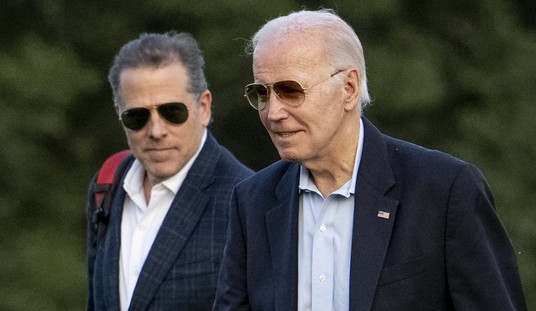Remember the old head-scratcher? Who’s taller? The world’s smallest giant or the world’s tallest midget? Well the Los Angeles Times has another one for us. Is Egyptian president Morsi now the world’s most authoritarian democratic leader or the least restrictive dictator on earth? Put it another way: if you stage a “soft coup” are you still taking over the goverment?
The president’s decision to appoint Lt. Gen. Abdel Fattah Sisi to replace Tantawi as defense minister and chief of the military was regarded as a “soft coup” against Egypt’s old-guard establishment. It was also the latest move by Morsi, a conservative Islamist, to put his stamp on the fledgling government.
Since one of the first things he did was prosecute his media critics, the now alarmed Washington Post has admonished Morsi “to moderate his power grab”. While sympathetic to the fact that he had to draw before the Army cleared leather, the Washington Post expressed the hope that he would only shoot the army’s pistol out of it’s hand. Like the Lone Ranger.
Mr. Morsi probably had no alternative but to face off with the generals and consolidate his political standing. The military council would not have permitted a democracy to flourish. But Mr. Morsi must avoid the temptation of absolutism, and that means respecting other centers of power. He must still command a military establishment that has vast economic interests and is deeply rooted in the state. He must respect the secular and liberal forces who have been rivals to, and suspicious of, the Muslim Brotherhood.
Mr. Morsi also must learn to live with a certain amount of criticism. In recent days, the authorities announced prosecutions of journalists, some of them close to the military and not particularly sympathetic to Mr. Morsi. The president should not go down this road. He promised in a televised address on Sunday not to “narrow freedoms,” a pledge he must uphold at all costs if Egypt is to move beyond the stagnant authoritarianism of the Mubarak years.
The Post’s well-intentioned editorial misses the point. The entire purpose of grabbing power is so you do not have to share it; so you can ride roughshod over dissenting “secular and liberal forces”; so you can jail journalists whenever you want. It would be as likely for a President to to stage a “soft coup” in order to share power as it would be for robber to stick up a bank so that he could give the money away.
Michelle Dunne, writing in the Atlantic Council while following the line that Morsi had to draw on the army before the army drew on him, nevertheless faces the facts. “President Mohammed Morsi appears to be using last week’s Sinai crisis as an opportunity to implement a broader plan.” The article then proceeds to draw some indicative Red Lines.
Optimists on Twitter August 12 were saying that Morsi was finally removing the dregs of the Mubarak regime and would now implement the goals of the 2011 revolution. Certainly it would have been difficult, perhaps impossible, for Morsi to be an effective president under the constraints the SCAF had set up for him. But there is also the possibility that Morsi will move beyond the caution of his early appointments to bring more and more Brotherhood members or sympathizers into senior positions, carrying out the putsch that many have feared.
One development to watch closely is the fate of the constituent assembly, which was selected by the parliament and is working on a new draft constitution while facing a lawsuit that could end in its dissolution. Morsi has now seized from the SCAF the prerogative to appoint a new assembly should this one be dissolved. Another area to watch is senior judicial appointments; there have been rumors that Morsi will act soon to change the composition of the Supreme Constitutional Court, as some of the judges have sided with the SCAF against Morsi. Either of those steps would set off a new round of alarm bells in Egypt and beyond.
But if Morsi means to put the Brotherhood in the driver’s seat by the time those alarm bells ring the fire will have reduced the edifice of Egyptian democracy to ashes. An article in the Jerusalem Post by a former member of the diplomatic corps thinks the alarm bells should be ringing now.
Morsy now holds dictatorial powers surpassing by far those of erstwhile president Hosni Mubarak. They include direct supervision of the all-important drafting of the constitution; he can dismiss the Constituent Assembly if he is not satisfied with its progress and appoint new members tasked with having a text ready within three months. The constitution will then be submitted to the people for approval by referendum and new parliamentary elections will follow.
Under Morsy’s “guidance,” the constitution will be resolutely Islamic and the new laws will follow the Shari’a; already the (disbanded) parliament had started discussing lowering the marriage age for girls and introducing corporal punishment….
The new state of affairs does not bode well for the relations between Egypt and Israel. According to a number of reports in mainstream Egyptian media, Morsy has decided to limit relations to the strict minimum and vigorously prevent any manifestation of normalization. Though military dialogue will go on, especially concerning the long border between the two countries and the security situation, Israeli representatives should not expect a warm welcome from their new counterparts.
Though Egypt will strive to maintain good relations with the United States in order to continue receiving impressive sums in military and other aid, it is turning more and more to Arab countries for help. Already the emir of Qatar has deposited $2 billion in Egyptian coffers, and Saudi Arabia did the same a few weeks ago. Libya may do this as well.
Gaza will remain Morsy’s main stumbling block, and he will do his utmost to persuade Hamas to tighten its control and prevent further attacks in the Sinai Peninsula, to what effect is not clear.
Too many people are making money smuggling arms and ammunition.
But nothing is ringing in the State Department fire station. And the lack of reaction from official Washington puzzles him.
In short, Morsy’s Egypt is a new country, with a new religious agenda that it is eager to implement. What is strange is that neither the United States nor the other Western powers appear worried.
One wonders when the penny will drop.
But maybe that is the wrong metaphor. We should be waiting for the next act to begin.
Belmont Commenters
How to Publish on Amazon’s Kindle for $2.99
The Three Conjectures at Amazon Kindle for $1.99
Storming the Castle at Amazon Kindle for $3.99
No Way In at Amazon Kindle $8.95, print $9.99









Join the conversation as a VIP Member